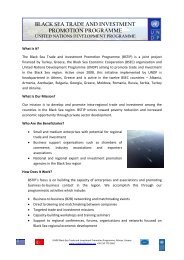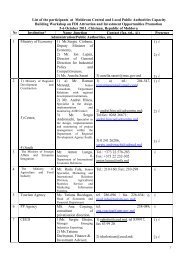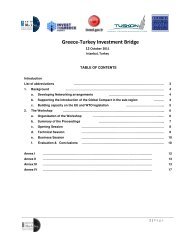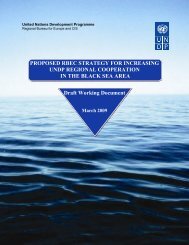Tradeflow Study - UNDP Black Sea Trade and Investment Promotion ...
Tradeflow Study - UNDP Black Sea Trade and Investment Promotion ...
Tradeflow Study - UNDP Black Sea Trade and Investment Promotion ...
Create successful ePaper yourself
Turn your PDF publications into a flip-book with our unique Google optimized e-Paper software.
.<br />
divided by each mode of supply, for which three options are available. A Member can make<br />
No limitation on conditions for Market Access of National Treatment (None - N); make an<br />
unbound commitment in this area so that the country retains the policy space to change its<br />
commitments in these areas (Unbound – U); or countries can make some a bound<br />
commitment in the services sector which means that it will make a commitment to allow some<br />
access to its market (or provide some national treatment) but with exceptions (Bound – B).<br />
Tables 15a-15f provide a summary if the commitments made by each country in the BSEC<br />
region with regard to limitations on Market Access <strong>and</strong> National treatment 8 . The tables<br />
present the percentage of commitments made in each subsector of the services activity<br />
according to whether the commitment is none (N), bound (B) or unbound (U). Furthermore,<br />
the table makes the distinction between each mode of supply. Only six countries are<br />
members of the WTO <strong>and</strong> thus data could only be collected for these six countries.<br />
In Market Access, very few limitations are made in modes 1-3, except in financial services<br />
which for obvious regulatory reasons are considered more sensitive. Transport services are<br />
also relatively restricted <strong>and</strong> many subsectors remain unbound (for example, in mode 1, 45%<br />
of transport service subsectors have no limitations for market access, while the remaining<br />
subsectors (55%) have unbound commitments). Mode 4 remains heavily protected mainly as<br />
a result of immigration policies of the countries concerned.<br />
In National Treatment, <strong>and</strong> in mode 1, Albania, Armenia, Georgia <strong>and</strong> Romania have<br />
relatively few restrictions in subsectors. Exceptions include construction services,<br />
environmental services, financial services <strong>and</strong> tourism services. Turkey has a number of<br />
restrictions for subsectors of business <strong>and</strong> communications services. Greece has maintained<br />
limitations business, construction, distribution, environmental, health, tourism, recreational<br />
<strong>and</strong> cultural, <strong>and</strong> transport services. In modes 2-3, nearly all countries have no limitation on<br />
National Treatment in all subsectors with the exception of Turkey, especially in financial<br />
services, business services <strong>and</strong> tourism services. Mode 4 tends to be unbound for most<br />
countries indicating that the temporary movement of natural persons remains restricted.<br />
Nevertheless, Albania, Romania <strong>and</strong> Turkey have a number of subsectors which have no<br />
limitations in National Treatment for the temporary movement of natural persons.<br />
8 The commitments made at the horizontal level have not been incorporated into the tables<br />
50/135






